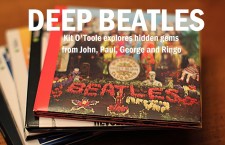Some of the best Beatles performances were, for many years, not officially available anywhere. From 1962-1965, the group played live on 53 BBC radio programs, treating audiences to their current hit singles as well as cover versions of their favorite American artists.
Sadly, some of these appearances were not archived and thought lost. Thus, American fans never heard some of the Beatles’ finest shows, unmarred by screaming. For decades, fans read tantalizing descriptions of the BBC sessions through works by Mark Lewisohn, or heard radio documentaries by Kevin Howlett (BBC Radio 1’s Beatles at the Beeb). If they looked hard enough, collectors could find bootlegs of these mini-concerts, although they were incomplete and sorely lacking in sound quality.
Finally, Apple agreed to release some of the BBC sessions in 1994’s acclaimed collection Live at the BBC, just before the mania of Anthology. Almost 20 years passed before releasing this year’s On Air: Live at the BBC Volume 2. Howlett offers a perfect companion for this occasion with his book The Beatles: The BBC Archives, a gorgeously packaged tome detailing all their BBC appearances from 1962 until their 1970 breakup.
Numerous rarely seen photographs accompany the text, and often humorous audience feedback forms illustrate how the BBC carefully analyzed every Beatles appearance for any objectionable material; even a security guard filled out a form! More fascinating, however, is Howlett’s examination of how the BBC proved crucial in breaking the Beatles in the UK. In turn, the Beatles helped change the BBC by forcing them to include more rock into their programs.
Those wanting details about every instrument the group utilized in their live performances may be disappointed by the lack of information here. However, Howlett explains why the Beatles chose certain R&B classics as well as songs they included in their Hamburg sets. He quotes Ringo Starr as stating that the songs “proved we were a working band … everyone gets to Sgt. Pepper and thinks that’s what we were — but we were doing every club on the planet!” Through their in-studio appearances, large audiences could experience who the Beatles were — their musical chops and witty banter charmed fans and urged them to buy records in droves.
In turn, the Beatles changed the BBC. As they became more popular, the BBC could no longer deny their ability to draw ratings. Screaming and fainting fans as well as rowdy rock music were new to the previously stuffy broadcasting system. Howlett’s descriptions of early chaotic tapings of TV specials, leaving camera crew and directors perplexed, show the old guard coping with new sounds and attitudes. After viewing a 1963 program entitled It’s the Beatles, a BBC Viewing Panel member offered this reaction: “At last, the BBC … letting themselves go. This was absolutely wonderful.” Youth had officially broken through on television.
Howlett includes useful transcriptions of BBC interviews, with the Beatles never losing their humorous streak even in their final days as a band. Early interviews reveal a bemused group slightly baffled by their fame, clearly not expecting it to last long. David Frost and other TV presenters constantly asked them what they plan to do once their popularity fades, often leading to unintentionally funny answers.
In 1964, Frost asked Paul McCartney if he could envision any other occupation besides music. McCartney responds that he would probably retire someday; Frost reacts by stating, “It will be a great pleasure to watch Paul McCartney in retirement, but it’ll probably be in the year about 2010, I should think.” Other times the transcripts reveal songs in progress: during a 1964 interview, Starr reveals that he has written a track with the lyrics “Don’t pass me by, don’t make me cry — don’t make me blue,” which would surface four years later on the White Album.
By 1966, the Beatles retired from the road and from live BBC concerts. They still appeared for interviews and provided music videos for “Strawberry Fields Forever” and “Penny Lane.” The BBC infamously agreed to air their 1967 commercial disappointment Magical Mystery Tour. At this point, the Beatles had achieved their goal of becoming top-selling artists, and no longer depended on BBC performances to get noticed. Howlett includes interoffice correspondence to prove that the BBC still needed the Beatles, and clamored to have them perform again. They eagerly interviewed the band, recognizing that their viewing and listening audience had changed. No longer was the BBC appealing to older audiences with “sanitized, safe” material—now rock had become mainstream, and youth had officially overtaken British pop culture.
Howlett’s The Beatles: The BBC Archives sheds light on a lesser-known period in the band’s history, and successfully explains how the Beatles and BBC influenced each other. Those who cannot remember a time when the Internet and MTV did not exist will find tales of the early days of music promotion riveting. Fans and collectors will use it for research, although the book is a fun read due to entertaining propose rather than simply dry facts. At a time when Beatles products are flooding the market, The BBC Archives has carved out a niche in an already crowded field.
The book comes in a case also containing a glossy Beatles photograph from BBC archives and reproductions of select correspondence and audience research reports.
- How John Lennon Came Roaring Back on the Beatles’ White Album - November 22, 2023
- Five ‘With the Beatles’ Deep Cuts That Illustrate Their Lasting Debt to R&B - November 20, 2023
- Five Must-Hear Deep Cuts from the Beatles’ ‘Past Masters’ - March 7, 2023


